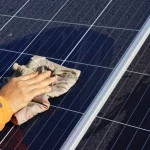MANUFACTURE AND TRANSPORT
CO₂ emissions from solar panels
The more solar panels we install in the United Kingdom, the less grey electricity we need to use. In order to become carbon neutral faster as a country, it is important to install a lot of solar panels. But solar panels themselves also have an ecological footprint. For instance, factories largely run on fossil fuels. And transport is also still largely done by boats or trucks with combustion engines.
Around 390 grams of CO₂ are released per kWh of grey electricity. Although our country is fully committed to renewable energy, we still remain largely dependent on fossil fuels and nuclear energy.
For every kWp of solar panels installed, our manufacturer emits around 600 kg of CO₂. That’s an average of just under 200 kg of CO₂ per solar panel. This includes raw material processing, manufacturing, and recycling. Once your solar panels are on your roof, they no longer emit anything.
Calculation example
If a 390 kWh solar panel generates solar energy for two years, you will save 284 kg of CO₂ emissions: 390 × 0.364 × 2 = 284 kg CO₂
This means that a 390 Wp solar panel will have already offset the carbon emissions from its production within two years. After that, your solar panels will generate clean renewable energy for another 23 to 28 years.
How much carbon emissions will you be able to save using your solar panels?
Installing 16 panels of 390 Wp each will save around 2,000 kg of CO₂ each year. That is roughly equivalent to the CO₂ emitted when you drive your car 10,000 km.
Can solar panels be recycled?
Yes, solar panels are almost completely recyclable. The main component of solar panels is silicon. This material does not lose its properties and can therefore be reused indefinitely. The other components of a solar panel are glass or aluminium. These materials can also be easily recycled. As a result, you need at least 70% less energy in order to make a recycled solar panel.


